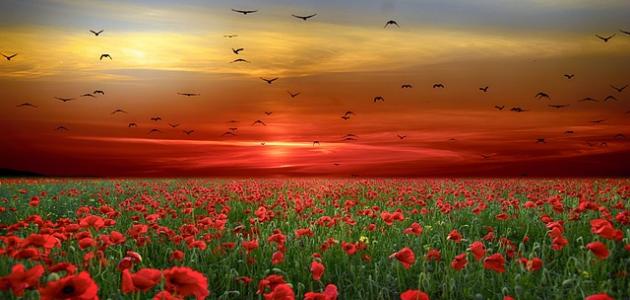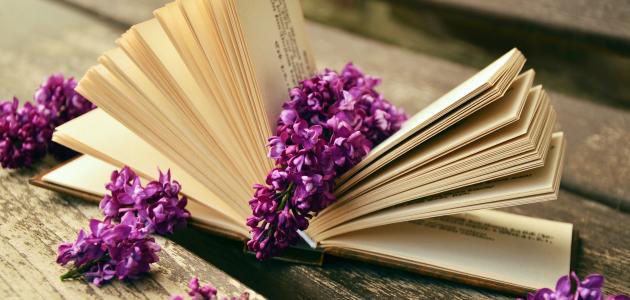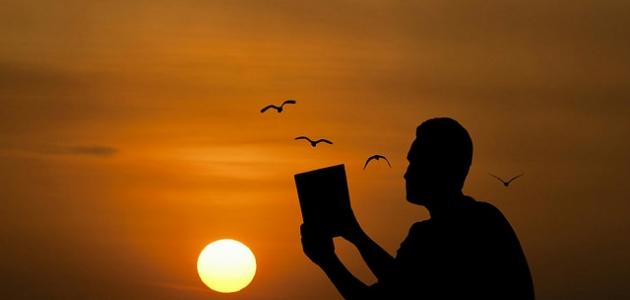Romantic poetry
Poetry is one of the literary arts, which many poets excelled in mastering. This art requires real talent and a very high feeling, in order for the poet to express what is going on in his soul, whether sadness, love, praise, or separation. We will mention here some of the verses of love and romance:
I love you so much
Nizar bin Tawfiq al-Qabbani was born and died in 1923-1998 AD. He was a contemporary Syrian diplomat and poet. He was born on March 21, 1923 AD, from an ancient Damascene family. His grandfather, Abu Khalil al-Qabbani, is considered the pioneer of Arab theatre. He published his first collection of poems in 1944 AD, entitled “The Brunette Told Me,” and he was buried. In his hometown of Damascus, Nizar classified this poem as a romantic poem:
I love you so much
And I know that the road to the impossible is long
And I know that you are six women
And I have no alternative
I know the time for nostalgia is over
And the beautiful words died
I'm not women what to say
I love you so much
I love you so much and I know I live in exile
And you are in exile
And between you and me
Wind
cloudy
And lightning
Thunder
And snow and fire
And I know that reaching your eyes is an illusion
I know I can reach you
Read also:Ghazal versessuicide
I am happy
To tear myself for you, my dear
And if they chose me
To repeat your love for the second time
Whoever spun your shirt from tree leaves
None of you patiently protected you from raindrops
I love you so much
And I know that I travel in the sea of your eyes
Without certainty
And I leave my mind behind and run
I run
I'm running crazy
Any woman holding a heart in her hands
I asked God not to leave me
do not leave me
What would I be if you weren't?
I love you so much
And very, very
And I refuse from the fire of your love to resign
Can someone who is in love resign?
And I don't care
If you come out of love alive
And I don't care
If you come out dead
I want your behavior and the heart refuses
Ahmed Shawqi Ali Ahmed Shawqi Bey Ahmed Shawqi was born in the Hanafi neighborhood in Cairo. He was born on October 16, 1868 AD, to a Circassian father and a Greek-Turkish mother. He is an Egyptian writer and poet who is considered one of the greatest Arabic poets in modern times. He is called “the prince of poets.” Shawqi remained appreciated by the people. Until death surprised him after he had finished composing a long poem in which he saluted the shark project that the youth of Egypt promoted, and he died on October 14, 1932 AD. Among his poems about love and romance are:
Read also:Pre-Islamic poetry in spinningI want your comfort and the heart refuses
- Your admonition and self-fulfillment are my admonitions
And I leave you and my sleep leaves me
- And the darkness makes me sad and distressed
And I remind you to see every good thing
- So my eyes and my heart are pouring
And complain about my torment in your fancy
- And I reward you for the torture with love
And I know that you have always been dry
- So why did I make love a habit
And the Lord is as blaming as the living, complaining
Read also:Short poetry verses- And filling the soul with it is passion and admonition
Would you reward me for the nearness?
- I thresholded you with passion, and stop blaming you
Every navigation among people is a sin
- If the alarm counts on you as a sin
I took your love from my eyes and my heart
- My eyes have supplicated and the heart has answered
And you are one of the virtues in an example
- I ransomed you with a heart and a heart
I love you when you praise the good
- And I fear that he will become a habitual wanderer
And they said: In the alternative, satisfaction and spirit
- I threw away the alternative, I threw it hard
And I reviewed Rashad Asai Aslo
- What's wrong with solace?
If the cup does not go away my worries
- The bartender's hand has been repented, and damn it
I must abstain from drinking it
- And I drink more generously than the virgins of the monastery
And I have a soul that I see, so it flaunts
- Like a rose flower, we call it a flower
love Book
Nizar bin Tawfiq Al-Qabbani was born in 1923 AD. He is a contemporary Syrian diplomat and poet. Al-Qabbani inherited from his father his inclination towards poetry, just as he inherited from his grandfather his love for art in its various forms. Nizar was on a school sea trip to Rome in 1939 AD when he wrote his first poetic lines, flirting with waves and fish. In which he swam when he was 16 years old. In 1997, Qabbani was suffering from deteriorating health. Several months later, he died on April 30, 1998, at the age of 75, in London. He requested that he be buried in Damascus. Among his poems about love and romance are:
Love, my love
A beautiful poem written on the moon
Love is written on all the leaves
Love is engraved on
Bird feathers and raindrops
But any woman in my country
If she loves a man
She throws fifty stones
The most beautiful love
Mahmoud Darwish, the Palestinian resistance poet, and one of the most important contemporary Palestinian poets whose name is associated with the poetry of the revolution and the stolen homeland. Mahmoud Darwish, the second son of a family consisting of five sons and three daughters, was born in 1942 AD in the village of Al-Birwa. Darwish is considered one of the most prominent people who contributed to the development of modern Arabic poetry and Introducing symbolism into it, in Darwish’s poetry love for the homeland is mixed with the female lover. He classified this poem as a romantic poem and its type is prose:
Grass grows between the joints of a rock
We found ourselves strangers one day
The spring sky was composed of stars... and stars
I was composing a love paragraph.
For your eyes... I sang it
Your eyes know that I have waited a long time
As a bird waited for summer
I slept like a migrant's sleep
An eye sleeps, an eye will be awake for a long time
She cries for her sister
We are two lovers until the moon sleeps
We know that hugs and kisses
Spinning nights food
And that the morning calls my footsteps to go on
A new day is on the way
We are two friends, so he will see near me, palm by palm
Together we make bread and songs
Why do we question this path to any fate?
He walks us
Where did we get our feet?
It is enough for me and for you that I am walking
together forever
Why do we search for crying songs?
An old poetry collection
And we ask, our love, will it last?
I love you with the love of caravans, an oasis of grass and water
And love of the poor loaf
Grass grows between the joints of a rock
We found westerns one day
They always remain gentle.
God threw dirt in Buthaina's eyes
Jamil bin Muammar is Jamil bin Abdullah bin Muammar Al-Adhari Al-Quda’i, nicknamed Abu Amr. He is a poet and one of the famous lovers of the Arabs. He was eloquent, an advanced collector of poetry and novels, and in his early days he was a narrator of the poetry of Hadba bin Khashram, just as Katheer Azza was Jamil’s narrator later. He was nicknamed Jamil. Buthaina because of his intense love for her, and Jamil Buthaina classified this poem as a romantic poem and its type is a vertical poem from Bahr al-Taweel:
God threw splinter into Buthaina's eyes
- And in the hollows of its fangs, with pliers
She shot me with an arrow whose feather kohl did not harm
- The phenomena of my skin, it is in the heart my wounds
I wish I had gray hair before what you said
- From the announcer, Judge Samam Al-Dharih
So I died and you did not know that I had committed treason.
- Indeed, a profit-seeker is not a profit-seeker
Do not carry it and make it a felony
- I fanned out of it in a sultry breeze
I confess my sin that I wronged her
- The rest of her secret is not revealing
I love you more
In Mahmoud Darwish’s poetry, love for the homeland is mixed with the female lover, and in this poem he describes his love for the homeland as if it were his beloved:
You grow up, you grow up
No matter how dry you are
You will remain, in my eyes and my flesh, an angel
And remain as our love wanted me to see you
Your breeze is amber
And your land is sugar
And I love you...more
Your hands are weak
But I don't sing
Like all bulbuls
The chains
Teach me to fight
I fight, I fight
Because I love you more
Lyric Daggers Rose
My silence is a thunderous childhood
And a lily of blood
My heart
You are the wealth and the sky
And your heart is green
And the islands of passion are in you
So how come I don't love you more?
And you are as our love wanted me to see you
Your breeze is amber
And your land is sugar
And your heart is green
And sing your love child
In your sweet embrace
I grow bigger and bigger
The cup reader
Nizar bin Tawfiq Al-Qabbani says in the poem “The Cup Reader,” which was not just a poem. Nizar Qabbani wrote it and sent it to Halim in 1973 AD and asked him to sing it so that it would be published in 1976 AD. He founded a publishing house for his works in Beirut under the name “Nizar Qabbani Publications,” and Damascus and Beirut had a special place in his poetry. Perhaps the most prominent of them are “The Damascene Poem” and “O Lady of the World, O Beirut.” As for the poem The Cup Reader, its verses say:
She sat with fear in her eyes
You look at my upside down cup
She said
My son, do not be sad
Love on you is written
Hey My son,
He died a martyr
He who died on the religion of the beloved
Your cup is a terrifying world
And your life is travels and wars
You will love a lot and a lot
And you die often and often
And you will adore all the women of the earth
And return as the defeated king
In your life, my son, a woman
Her eyes, Glory be to God
Her mouth is drawn like a cluster
She made her laugh with music and flowers
But your sky is rainy
Your path is blocked
The sweetheart of your heart, my son
Sleeping in a watched palace
And the palace is big, my son
And dogs guard him and soldiers
And the princess of your heart is sleeping
Whoever enters her room is missing
Whoever asks for her hand
Whoever approaches her garden wall is missing
Who tried to undo her braids
Hey My son
Missing Missing
I saw and stared a lot
But I never read
A cup like yours
I never knew, my son
Sorrows similar to yours
You can never walk
In love as sharp as a dagger
And remain alone as shells
And you remain as sad as a willow
You can never go
In the sea of love without castles
And love millions of times
And return as the deposed king
Sahadi and Layla Vic have no limits
Ibn Al-Saati He was born in Damascus (553 AH - Ramadan 640 AH). He is Abu Al-Hasan Ali bin Muhammad bin Rustam bin Harthuz, known as Ibn Al-Saati, nicknamed Bahaa Al-Din, Al-Khorasani, then Al-Dimashqi. He was a famous poet, prominent in the circle of latecomers. He was nicknamed “the eye of the poets,” and he compiled a poem. Suhadi and Laila Feek has no limits to the fact that it is a romantic poem and its type is vertical:
My sorrows and my nights in you are limitless
- And a pleasant atmosphere is like the morning, with which I have no covenant
If lovers have a fatal love for you
- So what do you want, estrangement and repulsion?
For those who crave Indianness, nobility, and wealth
- Enough of your people's admonitions, fringes and coquettes
Reda Bey witnessed a sip soaking the echo
- When did the wanderer’s crops irrigate the witness?
And the death of words is safe for the tampon
- In the case of passion, intentional driving is not required
He teaches no deviation by stabbing its destiny
- And what is not alive is watered with rose blood
If it comes to fruition, the branch is bright and beautiful
- And if you look, the sword of my heart has a sheath
I appeal to her sick eyelids in my blood
- Only the fingertips and the cheek refuse to shed anything
My heart and its breasts are permitted
- It is prevented by Nahd and what India does
It is the sun that casts shade when it is near
- She becomes a deserter when distance obscures her
You feel sad and sad about death and semen
- It distances itself and becomes closer to misguidance and maturity
She came and met everything and the same
- Delegations of darkness from the top of the horizon are black
He dried me, her cheeks, my cheeks, and her buttocks
- And my heart, its earrings, my tears, and the necklace
He muted the anklet, the heart, and the darkness
- So the gap, the adornment, and the rival grew on it
Peace be upon Najd and those who live in its shadow
- And if only the ruler of desires benefits, we will find
If the fire of sorrow is extinguished after a break
- When she was young, after her extinction, she had
If I promised myself that I would meet her
- Her despair refused to keep her promise
And I refused to cure her breeze's ailments
- He has nothing but youth and passion
He recounts the hadiths of Dune and Banah
- And below the dune, Al-Bayd, Al-Iss, and Al-Wakhd
Patience is spent like blinking at its gazelles
- And my grandfather is like a sickness in my mind









